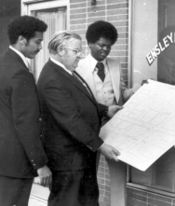David Vann

David Johnson Vann (born August 10, 1928 in Randolph County - died June 9, 2000) was the 24th Mayor of Birmingham. He continued to serve the city as special counsel to his successor, Richard Arrington, Jr and helped arrange numerous annexations of land into the city during the 1980s.
Vann attended Auburn High School and then the University of Alabama. He earned his bachelor's degree in 1950 and finished law school in 1951. He was clerking for United States Supreme Court Justice Hugo Black in 1954 when the court handed down its landmark decision on school segregation in the case of Brown v. Board of Education.
Vann returned to Birmingham after completing his term as clerk and joined the firm of Bradley, Arant, All and Rose. He filed a lawsuit that forced changes in Alabama's legislative districting and was one of the leaders who helped organize the 1963 referendum on Birmingham's form of government which ended Bull Connor's reign as Commissioner of Public Safety and ushered Albert Boutwell into the mayor's office. Vann served as a special assistant to Boutwell during his term.
In 1971 Vann won an at-large seat on the Birmingham City Council. He was one of the leaders of the failed "One Great City" campaign aimed at merging Birmingham and its suburbs under a single county-wide municipal government.
In 1975, with the endorsement of fellow Councilor Richard Arrington, Jr, Vann was elected Mayor by a slim margin. He served one term and was generally considered to be an intelligent administrator, but perhaps not a fast mover. He supported efforts by attorney Ed Meyerson to attract the Buffalo Braves NBA team to Birmingham. The team moved to San Diego, California and became the Clippers instead.
Vann was defeated in the 1979 Birmingham mayoral election by Arrington himself, who became the first African American mayor of Birmingham. The 1979 election followed closely on the heels of the controversial shooting of Bonita Carter by Birmingham Police Officer George Sand. Vann's handling of controversy exposed deep divisions in the city and is credited for neutralizing his support among Blacks while at the same time angering many in the white community. Despite $70,000 in campaign funds, he finished fourth in the race, behind Arrington, Frank Parsons, and John Katopodis. During the runoff between Arrington and Parsons, Vann made no endorsements, but did make known his intention of voting for Arrington.
Beginning in 1980 Vann worked as a lobbyist and special counsel to Arrington. He helped lead the mayor's aggressive annexation campaign and also served two terms as chair of the Birmingham Water Works Board. He was also a founding board member of the Birmingham Civil Rights Insitute.
Vann died in Birmingham in June 2000. The David J. Vann Municipal Justice Center is named in his honor.
| Preceded by: George Seibels |
Mayor of Birmingham 1975–1979 |
Succeeded by: Richard Arrington, Jr |
References
- Casey, Ron (1979) "The Election of Birmingham's Black Mayor" Southern Changes: The Journal of the Southern Regional Council. Vol. 2, No. 3
- Archibald, John (June 10, 2000) "Ex-mayor David Vann dies at 71." Birmingham News
- Whiting, Marvin Yeomans (1997) One Great City: The Campaign for Consolidated Government, Birmingham, Alabama, 1970-1971. Birmingham: Birmingham Public Library
External links
- David J. Vann papers at the Birmingham Public Library Archives